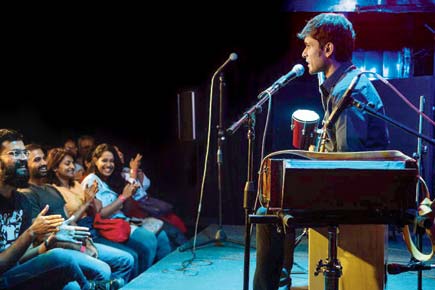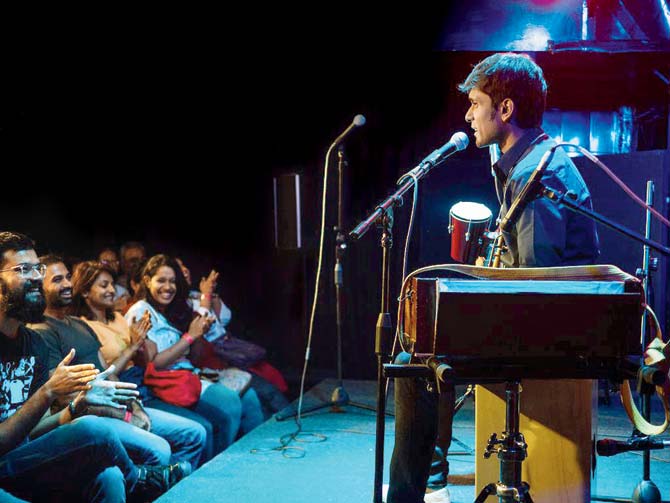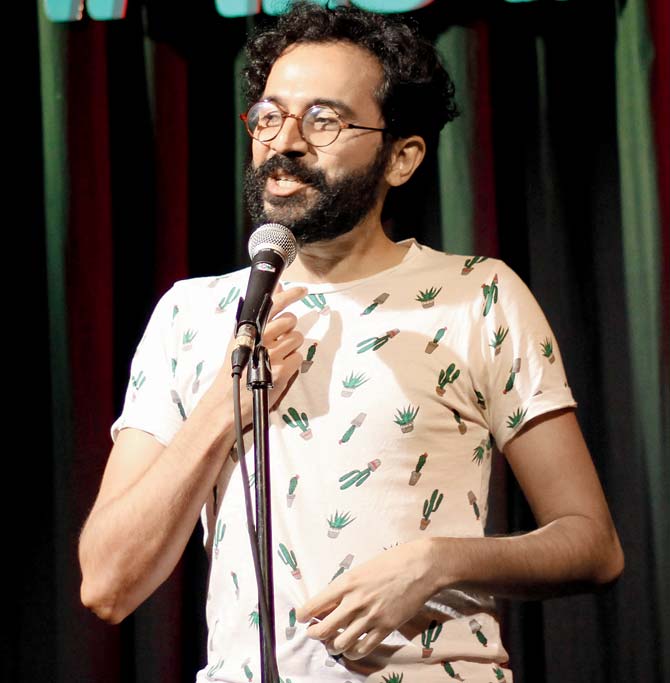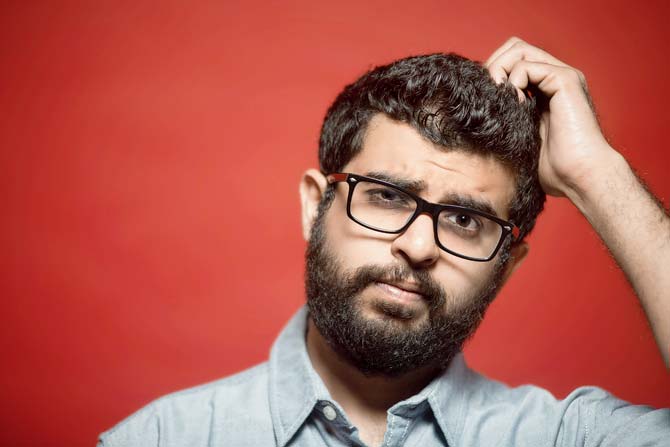Stand-up may have arrived as a western idea, but a growing tribe of regional talent is drawing from their roots to make us laugh louder


Alexander Babu also carried instruments like the harmonium and cajon for his first solo Tamil-English set in Mumbai
Last weekend, Gaurav Pawar cracked a joke that went: "As a kid, if you failed in an exam, you were scared your parents would slap you. But I was scared of a fake encounter because my parents are cops."
ADVERTISEMENT
A regular on Mumbai's open mic circuit for a year, the 29-year-old stand-up comedian had tested the gag in English earlier. Except this time, he said it much more confidently, in his mother tongue, Marathi, drawing laughs from a 100-member audience in the performance space of Brewbot, Andheri.

Sarang Sathaye, host for SMS. Pic courtesy/Sahil Shah, Culture Shoq
Pawar, and seven other Mumbai-based comics, including 17-year-old Divya Kharnare, spun gags on a range of subjects — from politics and religion to sex and stereotypes about the Maharashtrian community — all in Marathi, at the first edition of SMS (Secret Marathi Stand-Up). "Back in the '70s, Marathi theatre had a strong stand-up tradition, thanks to satirists like PL Deshpande. Then, the humour turned slapstick with mimicry-based TV shows. The idea is to revive Marathi comedy in a format that the younger generation relates to," says Sarang Sathaye, co-founder of Bharatiya Digital Party (BhaDiPa), organisers of the curated open mic.

Aakash Mehta
The regions rise
Marathi isn't the only language the audience is warming up to. A fortnight ago, Chennai-based Alexander Babu received a standing ovation for his first solo showcase in Mumbai, at The Cuckoo Club. This, despite the fact that 40 per cent of the two-hour set was in Tamil, which was mainly musical content. Audience member Sarita Anukumar says, "All the Tamil references were lost on me, but I enjoyed the show because of Alex's vibe. A majority of the audience comprised college students and working professionals."
Manan Desai met a similar demographic at the two Gujarati stand-up acts this year at Canvas Laugh Club (CLC) in Lower Parel. The Vadodara-based comic, who has co-founded The Comedy Factory, says, "The crowds are mainly SoBo Gujjus who are familiar with the language but may not speak it all the time. Though still a small number, regional comedy does have takers."
Go local, stand out
So, when did it become cool to perform in your mother tongue? "A couple of years ago, when stand-up comedians arrived here from the north and started performing in Hindi. They showed Hindi has a better connect with the audience," says Punit Pania of Chalta Hai Comedy.
Aakash Mehta, 24, who has performed across Mumbai, Pune, Ahmedabad and Vadodara in the last five years and runs Lasoon Live that often curates open mic jams at antiSOCIAL, agrees. "When you speak in a regional language, especially your mother tongue, you can present a more nuanced set, with specific dialect and words intrinsic to the language. It turns out more humorous. That's not always possible in a purely English set. Since the audience here is largely cosmopolitan, I can't perform a complete regional set. But I add words like faraq (Gujarati: difference) or kharach (Marathi: truly) to make it stand out."
This shows that stand-up comedy has come a long way from 2010, when UK-based The Comedy Store set up shop in Lower Parel, and allowed only English stand-up comedians on its stage, flying down international acts every week. "When CLC came in its place four years ago, it started adding more local comedians and regional content to its roster," says its programming manager Sujit Nair.
What's with the Hindi, dude?
The CLC line-up has featured popular Chennai-based comedians Aravind SA and Karthik Kumar, north Indian comedians Jeeveshu Ahluwalia, Abhishek Upmanyu and Zakir Khan, who has a Hindi stand-up special on Amazon Prime to his credit. "Now, most Mumbai comics, including myself, add about 40 per cent Hindi references. Even, collectives like AIB are targeting mass numbers by releasing online content that's largely in Hindi. Today, no one except Vir Das performs a complete set in English," adds Pania.
So, are new-age venues also open to different dialects as guests sip on ciders and ales? "Since regional comedy scene is at a nascent stage, they assume we'll perform only in English but most are opening up to Hindi stand-up gigs," says Pania.
Going viral
While Hindi still has a mass appeal, comics feel the bigger challenge is for Marathi, Gujarati, Bengali and south Indian languages that need to cross the state- and community-specific barriers. "However, that's possible due to digital penetration across the country. Language isn't a barrier anymore. Having a video that's gone viral helps," says Sudeip Nair, founder of The Hive, which curates events across the performing arts, with a strong regional focus.
Babu seconds, "I would be doing stand-up only in Chennai if it weren't for my videos on YouTube. When I came to Mumbai, the audience already knew what to expect."
Let's talk numbers
At a time when the English stand-up scene is coming of age, is it prudent to shift gears and opt for a career in regional comedy? "Not if the aim is to perform at comedy clubs abroad. You need to at least be multilingual since English is the only universal language," Pania says.
But that doesn't mean these comics have to scrap their regional set entirely. "A robust Indian diaspora across the world is keen to reconnect with their roots, and humour is the best way to do so," says Desai, who has performed for Gujarati NRIs in several parts of the US.
Until that happens, corporate shows are a comic's best bet. "There's a huge demand for stand-up comedy at community-specific societies and corporates. I do a corporate show in Mumbai every month," he adds. And the pay cheque is five times heftier than a pub show that earns a comic '7,000 to '10,000. "The biggest advantage is that when you perform in your language, you get a chance to expose your community to a variety of perspectives." A win-win, we think.
 Subscribe today by clicking the link and stay updated with the latest news!" Click here!
Subscribe today by clicking the link and stay updated with the latest news!" Click here!







